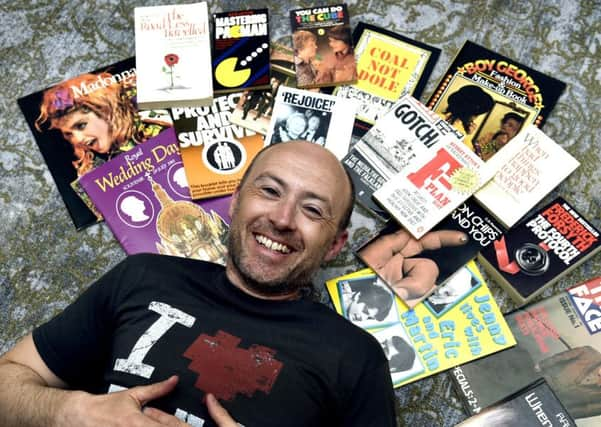Scotland’s ‘biggest ever’ 1980s retrospective to be staged by National Library


The impact of Madonna, Boy George, Margaret Thatcher, Sir Alex Ferguson, Grange Hill, Smash Hits and the Rubik’s Cube will all be featured in the multi-media retrospective created by the National Library of Scotland.
It will be trawling nearly three million items in its archives from the era to recall the birth of fake news, public panic about the prospect of nuclear war, the campaign to raise awareness of HIV and Aids, the first big health and fitness craze, and controversy over a clampdown on the promotion of homosexuality in schools.
Advertisement
Hide AdAdvertisement
Hide AdThe rise in marriages bridging Scotland’s infamous religious divide, the growth of video piracy, the arrival of refugees from Vietnam and the dramatic changes in the industrial landscape in Scotland are also expected to be recounted.
Key moments being marked in the retrospective, which will run until December, will include Sir Alex Ferguson leading Aberdeen Football Club to victory in Europe, the Royal Wedding of Charles and Diana, and the staging of the Glasgow Garden festival on the Clyde waterfront, two years before the city was named European Capital of Culture.
An exhibition of books, leaflets and other publications will open at the National Library’s main headquarters in Edinburgh and showcases historic artefacts to the festivals staged in the city in the 1980s. Classic films like Gregory’s Girl, Restless Natives, Local Hero and Highlander will be shown at the Kelvin Hall in Glasgow, where a retro gaming event will also be held.
A new online treasure trove, which is launched today, features archive news footage while leading figures from the decade will be penning essays reflecting on how their lives were transformed by the 1980s
Advertisement
Hide AdAdvertisement
Hide AdAmong the first participants to be confirmed are broadcasters Kate Adie and Sandy Gall, crime writers Ian Rankin and Val McDermid, musician Evelyn Glennie, chef Prue Leith and Phil Redmond, the creator of the TV series Grange Hill and Brookside.
The retrospective, entitled Back to the future: 1979-1989, will be divided into six major themes – international relations, UK politics, economics and employment, science and technology, social change, and culture and entertainment.
Graeme Hawley, head of general collections at the National Library, said: “We are always looking at interesting anniversaries that are coming up and there seemed to be lot of important things that happened in both 1979 and 1989.
“This year will see the 40th anniversaries of Margaret Thatcher’s first general election victory, the Iranian Revolution, and the Soviet invasion of Afghanistan, while it is the 30th anniversaries of the fall of the Berlin Wall, the massacre in Tiananmen Square, and the invention of the world wide web.
Advertisement
Hide AdAdvertisement
Hide Ad“Rather than just stage an exhibition we wanted to do something really interesting by using our collections in different ways. We actually have 2.9 million items in our collection from the 1980s. It is one of the densest periods covered in our archives and they really evolved over the course of the decade.
“Our capacity to collect things dramatically increased in the 1980s, there was a real increase in the number of things that were being published, and there was a real demassification of people splintering into their own different niches interests, groups and genres.
“We want to provide a series of lenses for people to look back at the 1980s. I don’t think people would imagine that we hold bound volumes of magazines like Smash Hits and Just Seventeen, for example. But we want to show that things like pop music, leg-warmers and the Rubik’s Cube were only one side of the story.
“We will be presenting a lot of things which were widely circulated at the time, that some people may have heard of, but have never actually seen before, such as the leaflets produced by the campaign to raise awareness of Aids, and the threat of nuclear war.
Advertisement
Hide AdAdvertisement
Hide Ad“We have some of the key texts which underpinned Margaret Thatcher’s economic policies. She was obviously a divisive personality but, irrespective of what people feel about her, those policies did kind of set the tone, not just for this country, but for American and most western economies, for what we now regard as neo-liberalism. We are publishing essays by our own staff as well as special guest writers, to write essays triggered by our collections, where possible, but reflecting on their own memories of the decade.”
A spokeswoman for the National Library said: “Our programme will invite people to question how well they know the period and will seek to engender conversation and understanding between people of different backgrounds, generations and world views.”